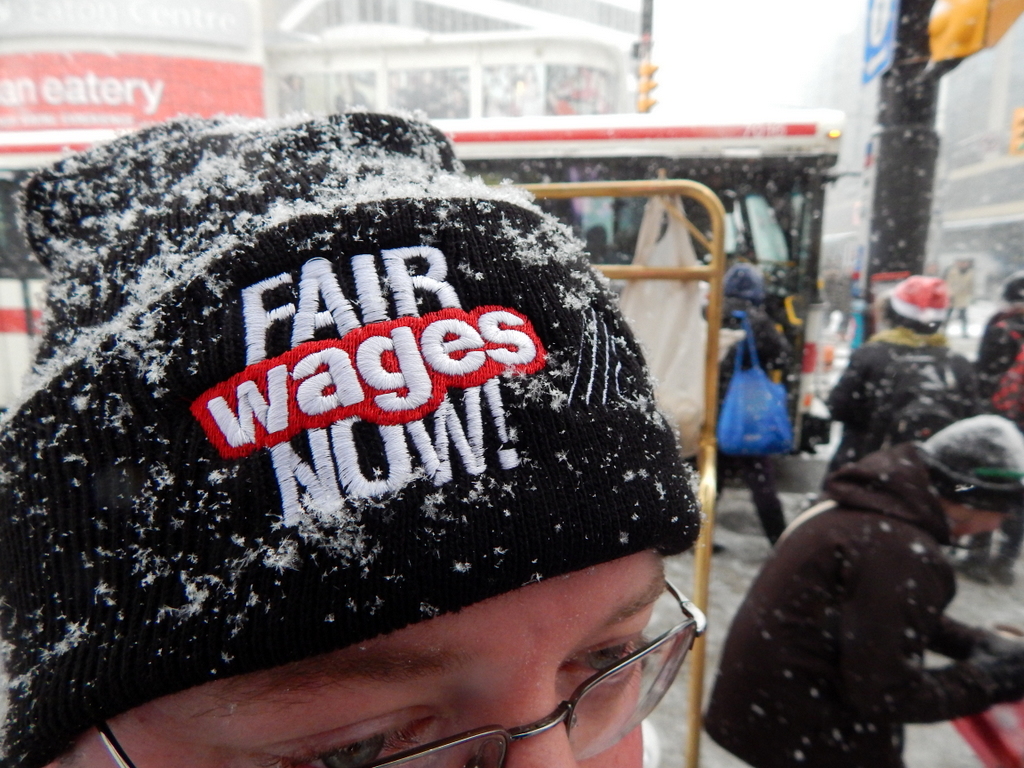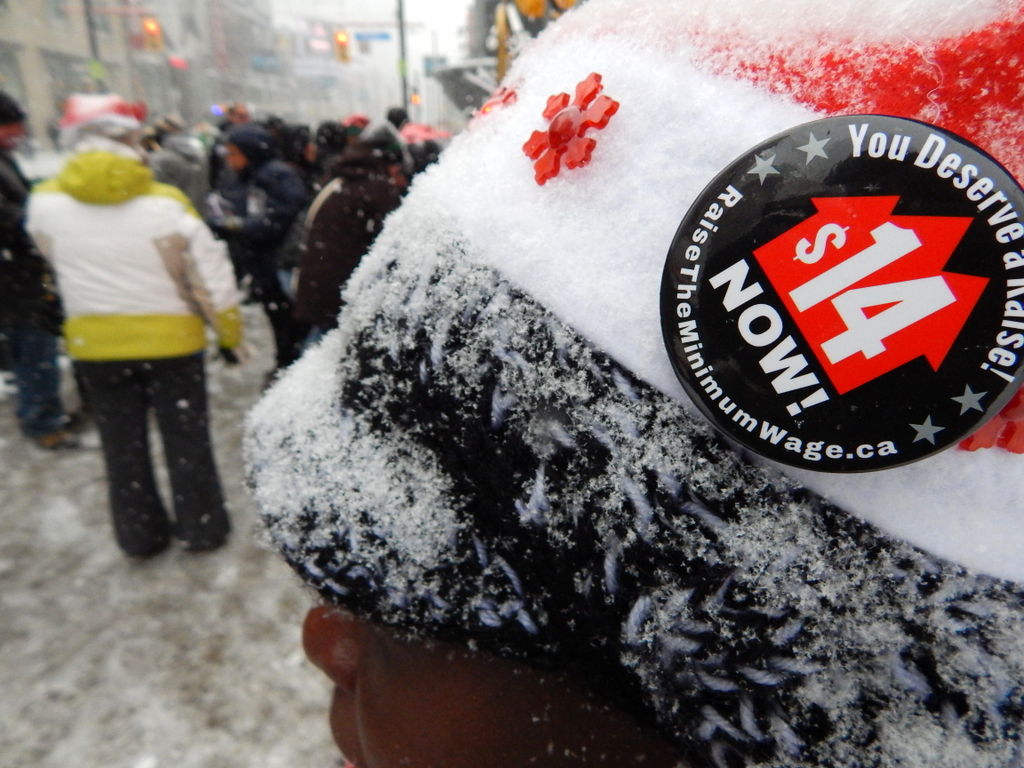Want to see more articles like this? Chip in to rabble.ca and change the conversation on labour in Canada.
Acsana Fernando doesn’t shop for nourishing food any more.
Fernando, a minimum-wage worker who’s employed through two temp agencies, doesn’t have that luxury. So every week, she scours the flyers for the cheapest products she can find.
“Just enough so we can have three meals a day,” she said.
Fernando is forced to budget down to the last penny to ensure she has enough for food, transportation and rent. Struggling to provide the bare necessities of life for her family.
She’s constantly worried that she’ll come up short and face eviction from the one-bedroom apartment she shares with her father and brother in an eastern suburb of Toronto.

Both of them are sick and unable to work, making Fernando the sole breadwinner.
She works as a support worker in a group home, taking care of young adults with various developmental disabilities. But her hours vary from week to week.
Sometimes she works 45 hours a week, other times only 35 or 40 hours.
“It’s another stress for me,” said Fernando.
And doesn’t leave her much time for anything else other than working and taking care of her brother and father. No time to think about her own future.

In the meantime, a bump in minimum wage from $10.25 to $14 per hour would allow her to put better food on the table and not have to juggle the rent and grocery money as much as she does now.
“Maybe able to save a little bit so I can have a better jacket or winter boots,” she said.
Maybe even a TTC Metropass. Right now, she’ll walk four or five kilometres just to save a transit token.
Because she works in different locations, often far from where she lives, she faces daily commuting times of five to six hours. But she needs the money.
“Any week I only work 35 hours I have a little panic attack,” she said. “If I don’t get 45 hours next week, I’ll be short either for rent or transportation (money).”
There are times that Fernando has had to rely on food banks to keep her family from going without nourishment.
“But it hampers with my work time and because the line is so long it takes at least two hours to get to my number,” she said.

Fernando’s shifts vary from week to week. Sometimes, she works from 3 p.m. to 11 p.m. Other times it’s 10 p.m. to 9 a.m. Or only a 4-hour shift.
And she can’t afford to turn down any shifts. Besides desperately needing the money, if she turns down a shift, the agency won’t call her again for a week.
Fortunately, her father’s doctor is sympathetic to Fernando’s situation, so he schedules her father’s appointments around her work schedule. He’s unable to get to his appointments unaccompanied.
Neither can her brother.
It takes two and a half hours to get from home to Sunnybrook Hospital, where her brother needs to see a specialist.
Fernando admitted it’s a difficult life. Certainly not the one she envisioned for herself when she came to Canada from Bangladesh 11 years ago.
“From that side of the world, we see Canada as a wealth country,” she said. “Working poor is what we want to get over.”
In January, Fernando’s life will become more difficult when TTC fare hikes go into effect.
“I don’t have any place to cut and get the money to get tokens,” she said. “So I am really struggling.”

In order to ease her burden and that of others, minimum-wage workers, community members and union activists across Ontario are calling on the Wynne government to raise the minimum wage to $14 per hour, thereafter indexed to the rate of inflation.
The minimum wage has been frozen for over three years, pushing Ontario workers nearly 20 per cent below the poverty line. An increase of $3.75 per hour would lift workers to 10 per cent above the poverty line.
The Campaign to Raise the Minimum Wage was launched in March 2013, with communities across Ontario demanding the government break the freeze.
Creative actions and rallies took place in 14 cities with local community groups and activists delivering their message to local MPP’s and Ministry of Labour offices.
The government-appointed Minimum Wage Advisory Panel is expected to make its recommendations in early 2014.
“But Ontarians can’t wait for another commission,” said the Campaign to Raise the Minimum Wage. “We need a raise now.”
On Saturday, the Campaign to Raise the Minimum wage continued its appeal by holding holiday actions in 16 communities across the province.
In Toronto, community members, the OPSEU Provincial Young Workers’ Committee and union activists handed out candy canes and hot chocolate outside the Eaton Centre as they collected signed holiday cards for the Premier, calling for a $14 minimum wage for all workers.
“It’s freezing cold but we are desperate,” said Acsana Fernando, addressing the crowd at a rally towards the end of the holiday action.
“Because the minimum wage has been frozen for three years.”
On the 14th day of every month, the Campaign to Raise the Minimum Wage holds an action, demanding the minimum wage be increased to $14 per hour.
“So all of us can have a better life,” said Fernando.
It was a bitterly cold morning as Toronto faced its first major snowstorm of the season.
“We might have been out here in the cold for a couple of hours,” said Wesley Killman, OPSEU Provincial Young Workers Committee.
“But the people of Ontario have been left out in the cold for years now. And it’s time to raise the minimum wage.”
A few days ago, Zelda, a long-time member of the Workers’ Action Centre, met with a group of mostly single mothers who told her that they can’t live on minimum wage.
Next year, when transit fares, grocery bills and rents increase, things will get even worse.

“If it (the minimum wage) was brought up to $14 that would generate $5 billion in the economy,” said Paul Codd, a spokesperson for the Campaign to Raise the Minimum Wage.
The next major action in the Campaign to Raise the Minimum Wage is a forum scheduled for Friday, January 24 at 6:30 p.m.
More details to be released in the new year.



